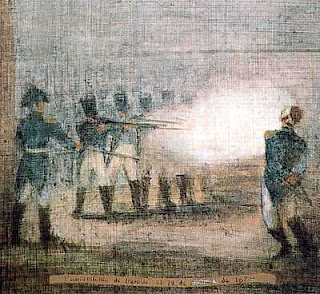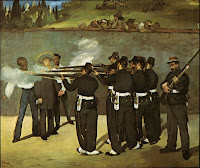Sunday Deposed Monarch Blogging: House of Iturbide
In the wake of the Mexican War of Independence, General Agustin de Iturbide came to power as head of Mexico’s new ruling junta. Originally an officer in the Spanish Army, General Iturbide had switched to the rebel side in 1820, a defection that proved important to the cause of Mexican independence. Iturbide defected, in part, because of his commitment to conservative criollo values; a coup d’etat in Spain had brought a liberal government to power, and Iturbide wished to protect Mexico from the threat of real revolution. Consequently, while Iturbide’s defection helped ensure Mexican independence, it also served to deradicalize the pro-independence forces.
Nevertheless, Iturbide remained a committed royalist. Part of the deal that brought  together the various pro-independence forces was a scheme to find a European monarch to replace Ferdinand VII on the throne of Mexico. However, no immediate replacement could be found, as few European monarchs had much of an interest in insulting Ferdinand. At the behest of his officers and men, Agustin de Iturbide decided to accept the throne, and was declared Emperor of Mexico in May 1822. The young emperor (thirty-nine years old when he assumed the throne) had been born in Mexico to Spanish parents. Unfortunately, he did not make a successful transition from military to civilian leadership. His management style grated on the rest of the ruling clique, and in early 1823 a movement developed to force his abdication. He gave up the throne in March 1823 and fled to Italy. For unclear reasons, he returned to Mexico in 1824, at which point he was immediately arrested and shot shortly thereafter.
together the various pro-independence forces was a scheme to find a European monarch to replace Ferdinand VII on the throne of Mexico. However, no immediate replacement could be found, as few European monarchs had much of an interest in insulting Ferdinand. At the behest of his officers and men, Agustin de Iturbide decided to accept the throne, and was declared Emperor of Mexico in May 1822. The young emperor (thirty-nine years old when he assumed the throne) had been born in Mexico to Spanish parents. Unfortunately, he did not make a successful transition from military to civilian leadership. His management style grated on the rest of the ruling clique, and in early 1823 a movement developed to force his abdication. He gave up the throne in March 1823 and fled to Italy. For unclear reasons, he returned to Mexico in 1824, at which point he was immediately arrested and shot shortly thereafter.
 In the absence of the strong, guiding hand of an Emperor, the Republic of Mexico proceeded to lose a third of its land territory and accumulate massive debts over the next forty years. In 1860, Britain, France, and Spain attacked Mexico in order to force the payment of debts. Although Britain and Spain soon withdrew, Napoleon III had other plans. French forces marched to Mexico City, and in 1864 placed Maximilian I on the throne. Mexican monarchists had previously entertained the idea of offering the crown to Maximilian, but he turned down an offer in 1859 because he suspected popular support for the monarchy was insufficient. Maximilian’s father was a Habsburg and his mother a Wittelsbach, giving him a suitably impressive bloodline for his stint as Emperor of Mexico. Sadly, Maximilian had been misled about the extent of royalist sentiment
In the absence of the strong, guiding hand of an Emperor, the Republic of Mexico proceeded to lose a third of its land territory and accumulate massive debts over the next forty years. In 1860, Britain, France, and Spain attacked Mexico in order to force the payment of debts. Although Britain and Spain soon withdrew, Napoleon III had other plans. French forces marched to Mexico City, and in 1864 placed Maximilian I on the throne. Mexican monarchists had previously entertained the idea of offering the crown to Maximilian, but he turned down an offer in 1859 because he suspected popular support for the monarchy was insufficient. Maximilian’s father was a Habsburg and his mother a Wittelsbach, giving him a suitably impressive bloodline for his stint as Emperor of Mexico. Sadly, Maximilian had been misled about the extent of royalist sentiment in Mexico. Although he adopted the grandsons of Agustin de Iturbide as his heirs, he was unable to win the support of Mexican liberals, and irritated conservatives through his efforts to win republican support. In 1866 France withdrew its troops at the behest of the United States, and Republican forces began to prevail. Captured in May 1867 after the fall of Queretaro, Maximilian was court martialed and, to the horror of the crowned heads of Europe, executed by firing squad.
in Mexico. Although he adopted the grandsons of Agustin de Iturbide as his heirs, he was unable to win the support of Mexican liberals, and irritated conservatives through his efforts to win republican support. In 1866 France withdrew its troops at the behest of the United States, and Republican forces began to prevail. Captured in May 1867 after the fall of Queretaro, Maximilian was court martialed and, to the horror of the crowned heads of Europe, executed by firing squad.
Agustin and Salvador de Iturbide, the appointed heirs of Maximilian, continued to press their claims to the Mexican throne, although without success. Agustin died in exile in the United States, and Salvador died of appendicitis in Venice. Salvador’s daughter Maria Joseph then became head of the Imperial House, dying in 1949 after being interned by the Rumanian Communist government after World War II. The current claimant to the throne of Mexico is Maximilian von Götzen-Iturbide, who presumably will become Maximilian II if his claim is recognized. Born in 1944, Maximiliano has demonstrated little interest in pressing his claim, perhaps because of the rather grim fates of his two predecessors. Prospects for a return to the throne appear extremely grim, as no monarchist movement worth mentioning exists in Mexico, and because of the lack of interest on the part of the Maximiliano, who currently lives in Australia.
Trivia: The current claimant to which throne has served successively as Minister of Health, Minister of Education, and Ambassador to the United States?


